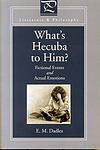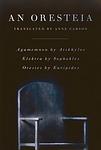Euripides
Euripides was an ancient Greek playwright, one of the three great tragedians of classical Athens, along with Aeschylus and Sophocles. He is known for having reshaped the formal structure of traditional Greek tragedy by showing strong female characters and intelligent slaves, and by satirizing many heroes of Greek mythology. His plays also often explored the darker aspects of human nature. Euripides' work has influenced drama and literature through the centuries, and he is credited with producing great tragedies such as 'Medea', 'The Bacchae', 'Hippolytus', and 'Electra'. His plays are still studied and performed today.
Books
This list of books are ONLY the books that have been ranked on the lists that are aggregated on this site. This is not a comprehensive list of all books by this author.
-
1. Medea
"Medea" is a Greek tragedy that tells the story of Medea, a former princess of the "barbarian" kingdom of Colchis, and her husband Jason, who leave her to marry Glauce, the daughter of Creon, king of Corinth. In a fit of rage, Medea decides to take revenge on Jason by killing their children, Jason's new wife, and her father, King Creon. The play explores themes of revenge, women's rights, and the dangers of absolute power.
-
2. The Bacchae
"The Bacchae" is a classic Greek tragedy where the god Dionysus, disguised as a mortal, returns to his birthplace in Greece to punish the impious King Pentheus who denies Dionysus's divine nature and refuses to worship him. The narrative explores themes of revenge, mortality, and the relationship between man and god. Dionysus uses his power to drive the women of the city into a crazed frenzy, leading to a tragic end for King Pentheus and his mother Agave.
-
3. Trojan Women
"Trojan Women" is a tragic play set in the aftermath of the Trojan War, focusing on the fate of the women of Troy. The story follows the mother of Hector, Hecuba, and her daughter-in-law, Andromache, as they grapple with the loss of their city and loved ones. They, along with other women, are destined to become slaves to the victorious Greeks. The narrative explores themes of war, suffering, and the resilience of women in the face of adversity.
-
4. Hippolytus
"Hippolytus" is a tragic play that revolves around the themes of lust, revenge, and the wrath of the gods. The story follows the character Hippolytus, a dedicated follower of the goddess Artemis, who spurns the advances of his stepmother Phaedra. In a fit of jealousy, Phaedra falsely accuses Hippolytus of rape, leading his father Theseus to curse him. The resulting divine punishment and misunderstandings lead to the tragic deaths of both Hippolytus and Phaedra, revealing the devastating consequences of deceit and the unforgiving nature of the gods.
-
5. Alcestis
"Alcestis" is a Greek tragedy that tells the story of a queen who voluntarily chooses to die in place of her husband, the king, when he is fated to die early. The king's friend, Heracles, visits them and, unaware of the queen's death, is offended that he is not being properly entertained. Upon learning the truth, he fights and defeats Death to bring the queen back to life, restoring happiness to the royal household. The play explores themes of love, sacrifice, death, and the power of friendship.
-
6. Andromache
The play centers on the plight of Andromache, a Trojan widow and the former wife of Hector, who is now a slave to the Greek conqueror Neoptolemus. She struggles to protect her son from the murderous intentions of Neoptolemus' new wife, Hermione, and her father, Menelaus. Andromache seeks sanctuary at the shrine of Thetis, as she confronts the harsh realities of her reduced status and the political machinations of her enemies. The play examines themes of power, revenge, and the fates of women in a world ravaged by war, ultimately leading to an intervention by the god Peleus, which prevents further bloodshed and resolves the immediate conflict.
-
7. Ion
"Ion" is a classical Greek tragedy that revolves around themes of identity, fate, and the complexities of family relationships. The play tells the story of a young man, Ion, who serves as an attendant at the temple of Apollo in Delphi. Unbeknownst to him, he is the son of Apollo and Creusa, the queen of Athens. Creusa, having been raped by Apollo and believing her child was dead, comes to the temple seeking answers about her lost son. A series of oracular revelations and dramatic encounters eventually lead to the recognition and reunion of mother and son. The play explores the intervention of the gods in human lives, the nature of legitimacy and inheritance, and the reconciliation of past trauma with present joy.
-
8. Helen
The play is a unique twist on the story of Helen of Troy, presenting an alternate version where Helen never actually went to Troy but was instead whisked away to Egypt by the gods while a phantom took her place, leading to the infamous Trojan War. In Egypt, the real Helen waits for her husband, Menelaus, to find her, while fending off the advances of the Egyptian king who desires her. When Menelaus finally arrives, he and Helen must concoct a plan to escape together, challenging the audience's perception of the myths surrounding Helen's beauty and the war fought in her name.
-
9. Iphigenia At Aulis
In this ancient Greek tragedy, a dire situation unfolds as the Greek fleet, ready to sail for Troy, is becalmed at Aulis. The leader of the Greeks, Agamemnon, faces a harrowing choice when the seer Calchas reveals that the goddess Artemis demands the sacrifice of his daughter, Iphigenia, to appease her and allow the winds to blow once more. Torn between duty and love, Agamemnon lures his daughter to Aulis under the pretense of a marriage to Achilles, only to confront the moral dilemma of sacrificing his child for the sake of his army's success. The play delves into themes of honor, sacrifice, and the devastating costs of war, as characters grapple with their fates and the consequences of their choices.
-
10. Cyclops
"Cyclops" is a satyr play that blends elements of comedy and tragedy, drawing from the mythological encounter between Odysseus and the titular one-eyed giant. The narrative follows Odysseus and his men as they become trapped in the cave of the Cyclops, a savage and uncivilized creature. Employing wit and cunning, Odysseus devises a plan to intoxicate the monster with wine and blind him, securing an escape for himself and his crew. The play explores themes of intelligence versus brute force, the struggle for survival, and the clever triumph of human ingenuity over monstrous barbarism.
-
11. Heracles
The play centers on the tragic hero Heracles, who, upon returning home from his labors, discovers that his wife and children are about to be executed by a tyrant who has usurped his throne. In a cruel twist of fate, Heracles is driven mad by the goddess Hera and, in his insanity, slays his own family, believing them to be his enemies. Upon regaining his sanity and realizing the horror of what he has done, Heracles is confronted with the unbearable weight of his actions and the loss of his family, leaving him to grapple with his guilt and the question of how to continue living after such a catastrophe.
-
12. Hecuba
The tragedy centers on the sorrow and vengeance of a queen who has lost her city, her husband, and her children to war. After the fall of Troy, she becomes a slave to the Greeks and faces the ultimate horror of witnessing the sacrifice of her daughter and the brutal murder of her last surviving son. Her grief transforms into a dark quest for retribution, leading her to take justice into her own hands, which raises profound questions about morality and the limits of human suffering.
-
13. Orestes
The play centers around Orestes, who, after obeying the god Apollo's command to avenge his father Agamemnon's murder by killing his mother Clytemnestra and her lover Aegisthus, is tormented by the Furies and rejected by his community. Facing execution, Orestes, along with his sister Electra and friend Pylades, concocts a desperate plan for survival that includes the potential murder of Helen, the wife of his absent brother Menelaus, and the taking of her daughter Hermione as a hostage. The play explores themes of justice, revenge, and the complexities of familial loyalty, culminating in a divine intervention that offers a resolution to Orestes' plight.












